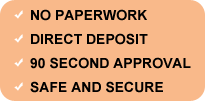
Most consumers are well-aware of the financial risks associated with impulse shopping. But knowing about something and being able to avoid such behavior can be two very different things. Nothing can derail your financial goals quicker than unplanned purchases made in haste.
Impulse buying used to be associated with small purchases...like the gauntlet of items you have to navigate to check out in any major grocery store or other retail outlet. Candy, soft drinks, magazines, lint rollers- you name it and it is probably going to be there to tempt you to throw it into your shopping cart. The stores know what they're doing. Any time you have to wait to check out, what else is there to do but look at all the things offered right in front of you?
There are some interesting statistics which suggest that impulse shopping now has moved into the realm of big purchases, such as cars and homes. A paper published by the National Bureau of Economic Research indicates that impulse buying is a real psychological occurrence and is much more widespread than originally thought. Just look at some of the surprising results:
An important detail to remember is that impulse buying is irrational. Purchases made in the heat of the moment rarely coincide with your long-term financial plans and if you are living on a tight budget or working towards financial independence, they can be utterly devastating.
We live in an instant-gratification culture. Savvy marketing people know exactly how to entice consumers into purchasing things they don't need or won't ever use or both. Let's face it- buying something can make you feel good (at least in the short-term). And there are times when you need to purchase an item. The key is planning for these times so that they don't wreck your budget and put you into a deep financial hole.
The following suggestions should help you avoid impulsive shopping by understanding what may trigger it and knowing what to do to guard against it.
There is a quote from Oscar Wilde, the brilliant Irish writer and poet, which says: "I can resist everything except temptation". That pretty much sums up impulse buying... it can feel very good in the moment. But the aftereffects can be sobering... unexpected expenses... additional debt... a budget in disarray. Keep your financial goals within reach by understanding impulse shopping and actively working to avoid its pitfalls. You (and your bank account) will be glad you did!

